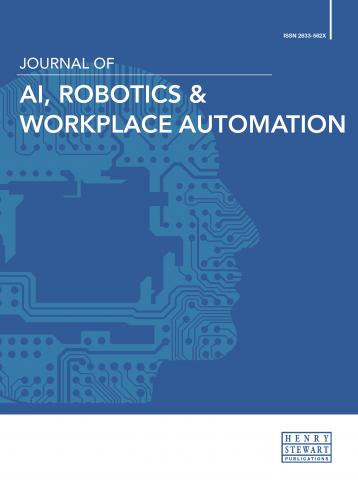"It's very exciting to see a peer-reviewed journal for our field. I'm impressed with the range of topics but also that the journal analyses emerging trends in all areas of advancement and communications. The quality of the articles I've seen so far is also very nice to see."
The intelligent, experiential and competitive workplace: Part 1
Click the button below to download the full text of the article.
Abstract: This two-part paper explores how intelligent automation and the convergence of accelerating technology advancements will shape the future of work and transform the workforce and the workplace of the future. Part 1 examines key intelligent automation advances and challenges with an overview of the emerging workforce and workplace models. Part 2 assesses the impact of intelligent automation and artificial intelligence (AI) upon the workforce and the workplace in greater depth, as well as the societal impacts to consider as these advancing technologies transform business, society and life itself. The paper begins with the premise that the business world is at a major inflection point whereby more businesses than not have completed their first phase of digital transformation. The COVID-19 pandemic accelerated AI, robotics, workplace automation and digital transformation initiatives that were already well underway. Trends that have been gathering momentum for years, such as workplace mobility and diverse ‘hybrid workplace’ behaviours, have rapidly gained adoption to now become mainstream. Just as the office is becoming an ecosystem of workplace options, the workforce is becoming increasingly ‘liquid’ and distributed; the ‘human cloud’ continues to evolve as many organisations turn to contract, on-demand, highly flexible and elastic labour models. Digital workplace technologies — from meeting solution software to enterprise chat platforms and desktop-as-a-service — have enabled the adoption of remote working and creation of workplace ecosystems inclusive of flexible ‘hybrid’ workplaces that can accommodate working in the office, at home or anywhere. As the post-digital era advances, the convergence of AI, robotics, workplace automation and virtual/augmented/extended reality (VR/AR/XR) technologies and 5G mobile networks will enable completely new ways of working and accelerate societal transformation. Digital technologies will enable rich, immersive and distributed virtual collaboration that will power new levels of human performance. The next phase of digital transformation will be driven by businesses willing to make AI investments to improve their competitive advantage. Over the next decade, AI will offer employees unprecedented information awareness and insight, providing greater freedom from low-value-add activities and the ability to easily adopt and use these emerging complex technologies. In the future of work, AI and immersive XR technologies will lead to greater levels of human–machine collaboration; however, policymakers, public and private organisations will need to address the risks and challenges of an increasingly AI-enabled digital world. New ways of working will offer the promise of unlocking greater human potential and may lead to some worker displacement, as well as intensifying the demand for greater workforce reskilling and continuous lifelong learning. Increasingly sophisticated AI applications, including facial recognition and deep learning neural networks, will provide new insights to address complex business problems and societal challenges. These very same advanced AI applications will also raise difficult questions regarding transparency, ethics, equity and privacy.
Keywords: digital transformation; intelligent automation; experiential workplace; virtual/extended reality; telepresence; immersive collaborative platform technologies; human–machine collaboration; robotic process automation (RPA)
Peter Miscovich With more than two decades of management consulting experience, Peter Miscovich pioneered JLL’s multi-year research and consulting efforts focused upon the high-performance workplace and the future of work. As a former partner with PricewaterhouseCoopers, Peter has served in multiple senior leadership roles overseeing 1.5bn sq. ft of corporate real estate transformation. He has led the development of multiple Fortune 100 corporate headquarters and workplace transformation engagements within the financial services, media, technology, telecommunications and healthcare sectors. Peter holds degrees from Massachusetts Institute of Technology in enterprise transformation and human performance improvement, and a BSc in civil engineering from the University of Arizona. His academic research affiliations include Columbia University, Harvard University, Stanford University and MIT. Peter serves on the Accenture Technology Vision Advisory Board and the CERES President’s Advisory Board. He is an advisor and thought leader for CoreNet Global, the Urban Land Institute and the World Economic Forum.



